Living in Babylon
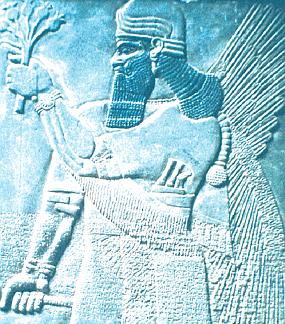 Does anyone really think that American society, government, or culture is somehow rooted in Christianity? What utter nonsense. Even the most casual observer of culture, stumbling across a book like The Protestant Ethic and the Spirit of Capitalism by Max Weber perhaps, should know better. You cannot reconcile the political and economic theories of John Locke and Adam Smith with the Gospel of Y'shua.
Does anyone really think that American society, government, or culture is somehow rooted in Christianity? What utter nonsense. Even the most casual observer of culture, stumbling across a book like The Protestant Ethic and the Spirit of Capitalism by Max Weber perhaps, should know better. You cannot reconcile the political and economic theories of John Locke and Adam Smith with the Gospel of Y'shua.
All our social structures, economics, laws & policies, and culture are undergirded by unitarian, nominalistic, and liberal (in the classical, not the partisan, sense) principles which are fundamentally at odds with Christianity. Those principles make our society rabidly individualistic with virtually no sense of mutual responsibility. Americans usually have good, kind intentions, and are capable of (and often do) great things, but the premises of our social, political, and economic structures are seriously messed up, and this has dire consequences both here and internationally.
From these nominalistic, unitarian, liberal principles grow massive, seemingly impenetrable "structures of sin" which have created a veritable "culture of death." (To borrow the apt terms coined by our Catholic brothers.) We are all shackled (whether physically, mentally, or spiritually) by "Babylon" without even knowing it!
Christian roots?
John Adams put his signature to the Treaty of Tripoli, passed unanimously by the U.S. Senate in 1797, which explicitly said "The Government of the United States is not in any sense founded on the Christian religion."
Were the "Founding Fathers" of the United States Christians? Many claimed to be, and perhaps some were, but more than a few were nominal Christians at best.
Patrick Henry wrote "this great Nation was founded not by religionists, but by Christians," and John Locke wrote, "a Christian I am sure I am." But when the roots of our government and society are examined, they show more evidence of unitarianism, deism, individualism, and liberalism than anything approaching Christianity. Even if the men were "Christians," their principles were incompatible with Christianity.
John Locke, for example, in his treatise on toleration, contrasts man in "a state of nature" with man living in a governed society. This document was a huge influence on the framers of the U.S. Constitution. The problem? Locke sees the man in "a state of nature" as a completely autonomous individual with no responsibilities to other people. Only when a man enters a "social contract" does he receive such responsibilities as a kind of "trade off." Those responsibilities conflict with his own natural rights, some of which he must "give up" to live with other people. One of the greatest virtues, in this view, is toleration and leaving other people alone, so long as your own interests don't come into conflict. Etc. etc.
Locke's scenario is not a Christian vision at all. For Christians, the God in whose image we humans are created is already a community or "society" of three divine Persons. As beings created in the image of the Trinitarian God, we originate in community and it is our nature to live in community or society with and for each other. Where Locke's "social contract" was an alien and extrinsic concept to natural man, we would say society is intrinsic to humans being who we are. Our rights and responsibilities do not conflict; they are mutually supporting. (E.g. You have a right not to be murdered and I have a responsibility never to murder you.) The greatest virtue, from a Christian perspective, is love (which is very nearly the opposite of Locke's idea).
Someone once tried to convince me that Thomas Jefferson was a Christian because he had written "in the front of his well-worn Bible," these words: "I am a real Christian, that is to say, a disciple of the doctrines of Jesus. I have little doubt that our whole country will soon be rallied to the unity of our Creator." Jefferson was also the chairman of the American Bible Society, I was told, which he considered his "highest and most important role."
What was said may be true, I suppose, but Jefferson was no Christian. Believing that "whole history of [the Gospels] is so defective and doubtful that it seems vain to attempt minute enquiry into it," Jefferson wrote his own "Bible," The Life and Morals of Jesus of Nazareth, from which Jefferson removed all the miracles, and especially the annunciation, virgin birth, and resurrection of Y'shua from death. Jefferson did not believe Y'shua is God, nor did he believe in the holy Trinity. He considered Paul the "great corruptor of the teachings of Jesus," and often said "I am of a sect by myself." That is Jefferson's so-called "real Christianity." He was a unitarian, and eagerly hoped "that the present generation will see Unitarianism become the general religion of the United States."
Jefferson had no particular love for Christianity: "I have examined all the known superstitions of the world and I do not find in our particular superstition of Christianity one redeeming feature. They are all alike founded on fables and mythology." The same Jefferson also wrote "Christianity neither is, nor ever was a part of the common law," and "I believe I am supported in my creed of materialism by Locke." Is it any wonder the man's principles are incompatible with Christianity?
From the bad roots of unitarianism, individualism, and liberalism grew the social structures, economics, laws & policies, and culture of the United States. And now, even the average Christian citizens of this country are so infected with the dominant invividualism, liberal principles, and unitarian concept of God that they can hadly tell the difference between "the American way of life" and Christianity. They actually seem to think that the Constitution represents Christian values rather than the values of John Locke & Adam Smith, or that the selfish values of Locke & Smith are somehow compatible with Christianity! No!
Bling Not
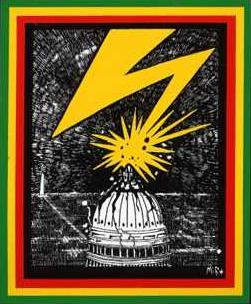
I am living in Babylon, D.C.
|
It's easy to condemn babylon in the halls of power. But can you root babylon out of your own heart?
What is babylon for real? Babylon loves things and uses people. Babylon loves riches and covets possessions, loves honor and being highly regarded by men, lusts for power, is arrogant and prideful of position, craves to adorn oneself with luxurious clothing and vain ornaments, itches for human glory, craves bodily pleasures over goodness. Babylon cares little or nothing for goodness, righteousness, holiness, justice, truth, love, mercy, generosity.
Babylon is everywhere there is evil, not just in governments and other powerful institutions. Though it is less likely in my experience, the poorest man starving on the street can have babylon in his heart just as surely as the richest billionaire exploiting slave labor for his own profit. How? Anyone who is jealous or envious of the wicked billionaire and has no more moral principles than that man is just as wicked as he.
When the Orthodox youth chant "death to the world!" (e.g. in the 'zine by that name) they are chanting down babylon, not condemning the created cosmos, because "the world" is one of babylon's many names in the scriptures.
If anyone loves money and power over people, even if he has neither money nor power, he is participating in babylon and cannot effectively chant it down.
More to come...
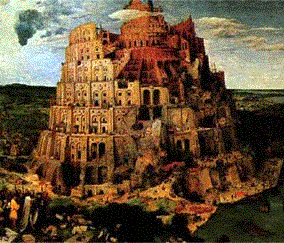
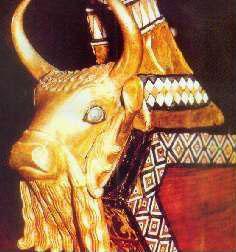
THE DESTRUCTION OF SENNACHERIB, by Lord Byron
The Assyrian came down like the wolf on the fold,
And his cohorts were gleaming in purple and gold;
And the sheen of their spears was like stars on the sea,
When the blue wave rolls nightly on deep Galilee.
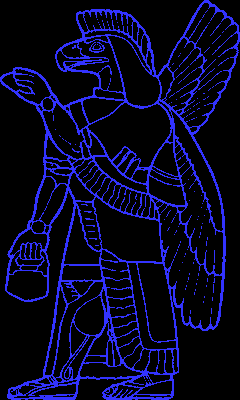 Like the leaves of the forest when Summer is green,
Like the leaves of the forest when Summer is green,
That host with their banners at sunset were seen:
Like the leaves of the forest when Autumn hath blown,
That host on the morrow lay withered and strown.
For the Angel of Death spread his wings on the blast,
And breathed in the face of the foe as he passed;
And the eyes of the sleepers waxed deadly and chill,
And their hearts but once heaved, and for ever grew still!
And there lay the steed with his nostril all wide,
But through it there rolled not the breath of his pride;
And the foam of his gasping lay white on the turf,
And cold as the spray of the rock-beating surf.
And there lay the rider distorted and pale,
With the dew on his brow, and the rust on his mail:
And the tents were all silent, the banners alone,
The lances unlifted, the trumpet unblown.
And the widows of Ashur are loud in their wail,
And the idols are broke in the temple of Baal;
And the might of the Gentile, unsmote by the sword,
Hath melted like snow in the glance of the Lord!
(In the days of Senncherib, Babylon was a province of Assyria.)
 Does anyone really think that American society, government, or culture is somehow rooted in Christianity? What utter nonsense. Even the most casual observer of culture, stumbling across a book like The Protestant Ethic and the Spirit of Capitalism by Max Weber perhaps, should know better. You cannot reconcile the political and economic theories of John Locke and Adam Smith with the Gospel of Y'shua.
Does anyone really think that American society, government, or culture is somehow rooted in Christianity? What utter nonsense. Even the most casual observer of culture, stumbling across a book like The Protestant Ethic and the Spirit of Capitalism by Max Weber perhaps, should know better. You cannot reconcile the political and economic theories of John Locke and Adam Smith with the Gospel of Y'shua.



 Like the leaves of the forest when Summer is green,
Like the leaves of the forest when Summer is green,